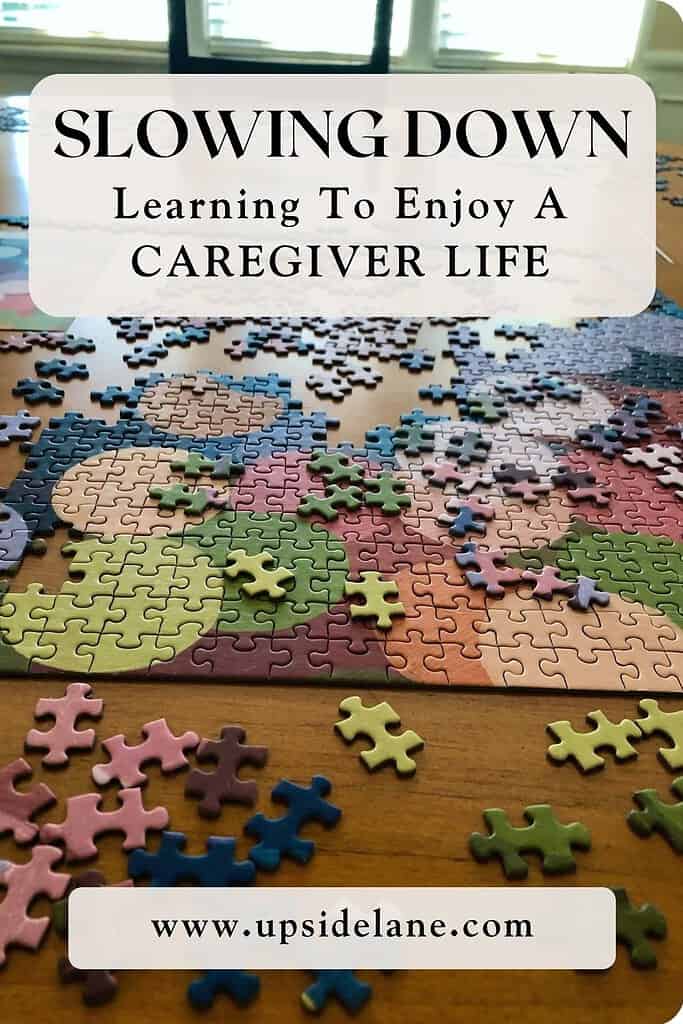Slowing Down And Learning To Enjoy A Caregiver Life
Find the value of slowing down in the fast-paced world of caregiving. Enjoy life amidst the demands of caregiving and modern living.

Slowing down is one way of prioritizing self-care as a busy caregiver, and it is critical for our own mental and physical health.
Adjusting to a slower pace while caring for Doug, who has Parkinson’s disease, isn’t always straightforward for me. My natural inclination is to be constantly on the go, looking ahead to the next task.
Over time, I have discovered the value of slowing down, which allowed me to find greater joy and fulfillment, not just in my role as a caregiver but in my overall life as well.
Learning to live at a slower pace reduced my stress levels, and it has also strengthened my relationships and improved my overall well-being.
Today’s Fast-Paced World
In today’s fast-paced world, caregivers often find themselves overwhelmed by the constant demands of daily tasks, the distractions of cell phones and social media, and the pressure to always be “on.”
The mental and physical toll of caregiving can be significant, and it can affect both emotional and physical health. This is why it is important for caregivers to embrace a slower pace of life, and learn to enjoy the present moment.
The Need For Slowing Down
The United States is a country where many live a high-speed lifestyle. This pace and pressure within the culture become the norm including among caregivers.
Many caregivers struggle to find enough time for themselves, often feeling trapped by an endless to-do list and the relentless pursuit of productivity.
Research by Khoury et al. highlights the benefits of slowing down through mindfulness-based therapy and mindfulness meditation. Stating these therapies help to reduce stress levels, improve emotional health, and enhance one’s overall quality of life and well-being.
By consciously choosing to slow down, caregivers can activate their parasympathetic nervous system, which helps counteract the overactive stress response system commonly activated in high-stress situations.

The Power Of The Present Moment
Spending time in the present moment is one of the best ways to cultivate mindfulness and reduce stress.
Instead of constantly worrying about the future, or ruminating on the past, caregivers can benefit from focusing on the here and now.
Here are some simple techniques I use to help keep me in the present moment.
Incorporating a mindfulness practice into your day encourages intentional pauses, and allows caregivers to check in with themselves and assess their current state of mind.
These moments of mindfulness can help reduce racing thoughts, lower blood pressure, and promote a greater sense of calm and well-being.
Quality Time Over Quantity
In our quest for productivity and efficiency, we often forget the importance of quality time. Caregivers may feel pressure to continually be doing something, whether it’s running errands, scheduling doctor visits, or keeping up with the latest news alerts. This constant busyness can detract us from the quality of time spent with our loved ones.
Slowing down allows caregivers to prioritize what truly matters, fostering stronger relationships and deeper connections with those around us.
Instead of rushing through interactions, it is important to take the time to fully engage with those we love and care for, whether it’s sharing a meal, going for a walk, or simply enjoying each other’s company. We must learn to appreciate the slow moments.

Embracing The Slow Lane
Embracing a slower pace of life doesn’t mean abandoning responsibilities or neglecting daily tasks. It’s about approaching life with a different mindset, one that values simplicity, mindfulness, and the simple pleasures of everyday life.
This could mean opting for “slow food” over fast food, taking a leisurely stroll instead of driving, spending the afternoon gardening or reading instead of running to the grocery store, or doing five loads of laundry.
By consciously choosing to live in the slow lane, caregivers can reduce stress levels, improve mental and physical health, and ultimately lead a more fulfilling life.
This intentional approach to living allows for better decision-making, greater appreciation for the good things in life, and a stronger sense of well-being.
10 Practical Tips For Slowing Down
- Limit Screen Time. Reduce time spent on cell phones, social media, and video games to create a low-intensity environment that promotes relaxation and mindfulness.
- Practice Mindfulness Meditation. Set aside a few minutes each day to practice mindfulness meditation, focusing on your breath and staying present in the moment.
- Create a To-Don’t List. Identify unimportant things that can be eliminated or delegated, freeing up time for activities that bring joy and fulfillment.
- Take Breaks Throughout the Day. Incorporate intentional pauses into your daily routine, allowing for moments of rest and reflection.
- Engage in Physical Activity. Regular exercise, such as walking or yoga, can help reduce stress, improve mood, and promote overall well-being.
- Savor Simple Pleasures. Take the time to enjoy the little things in life, whether it’s a beautiful sunset, a good meal, or a warm bath.
- Connect with Others. Develop strong relationships by spending quality time with loved ones, sharing your thoughts and feelings, and engaging in meaningful conversations.
- Spend Time In Nature. Make it a priority to spend time outdoors and connect with nature. Whether it is taking a walk, gardening, or simply sitting outside in a cozy chair enjoying the fresh air. Spending time in nature helps to reduce stress, improve mood, and promote a greater sense of peace and well-being.
- Practice Deep Breathing Exercises. Incorporate deep breathing exercises into your daily routine to help calm your mind and reduce stress. Taking a few minutes each day to focus on your breath can make a significant difference in your overall well-being.
- Read A Book or Engage in Creative Activities. Set aside time for reading or other creative activities such as painting, writing, or playing music. Reading or engaging in creative activities can be a great way to slow down, express yourself, and find joy in the present moment.

Slowing Down And The Impact On Mental And Physical Health
Slowing down and embracing a slower pace of life can have profound effects on both mental and physical health. Chronic stress, often exacerbated by the fast-paced nature of modern life, can lead to a host of health problems, including high blood pressure, heart disease, digestive issues, sleep problems, and more.
By reducing stress levels and promoting relaxation, caregivers can significantly improve their overall health and well-being. This includes better quality of sleep, improved concentration and focus, and a greater sense of peace and contentment.
The Value Of Free Time
In today’s society, free time is often seen as a luxury rather than a necessity. However, spending time doing activities that bring joy and fulfillment is essential for maintaining a healthy work-life balance and preventing burnout.
Free time allows caregivers to recharge their batteries and replenish their energy stores. Whether it is reading a good book, taking a walk in nature, or simply enjoying a quiet moment of solitude, free time is a moment to take care of yourself, and to make yourself a priority if just for a few moments.
This in turn will lead to better outcomes with caregiver responsibilities and a greater overall sense of well-being and satisfaction.
What Slowing Down Taught Me
Finding Peace On The Caregiver Journey
Slowing down and learning to enjoy the caregiver journey is not always easy, especially in a society that values speed and efficiency.
However, by making a conscious effort to embrace a slower pace of life, caregivers can reduce stress, improve mental and physical health, and ultimately lead a more fulfilling and meaningful life.
Ultimately, it is not about how much you accomplish or how busy you are but rather how well you take care of yourself and those around you.
By prioritizing self-care, nurturing strong relationships, and embracing the simple pleasures of everyday life, caregivers can find greater joy, peace, and satisfaction along the caregiver journey.
So let us all take a deep breath, slow down, and savor the best parts of life that often pass us by in the hustle and bustle of life.
Let’s Connect
I hope you found this article valuable, and I encourage you to share it with anyone you feel could benefit from its insights.
Also, let me know how you are doing as a caregiver. Are you taking time to slow down? And if you have, let me know what you’ve discovered.
You can share your thoughts and comments below, I read all responses and will get back to you promptly. I’d love to hear from you!




Love this. I slow down by nightly walks with my Fiancé before bed, and finding peace and meditation in cooking – especially chopping up vegetables! Nothing more meditative and calming
Hi Arianna, those tips for slowing down sound dreamy – love it. Thank for your comment and thank you for your support! 😉
Love these tips, Dawn! A great reminder to sloooowww down! And all the healthy benefits it brings!
Thank you Brenda. Soooo true. Appreciate your support!